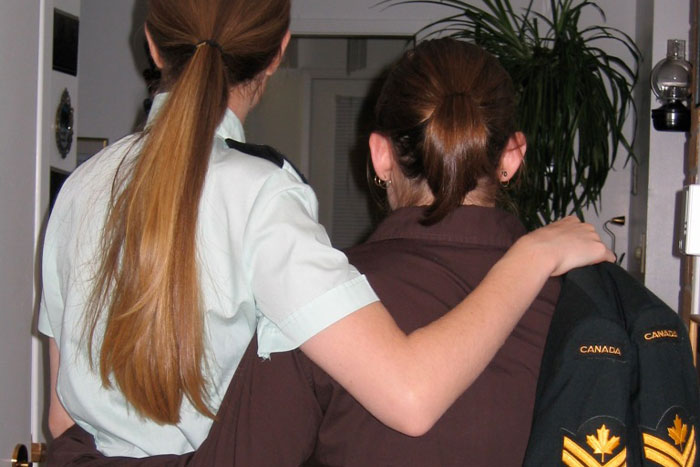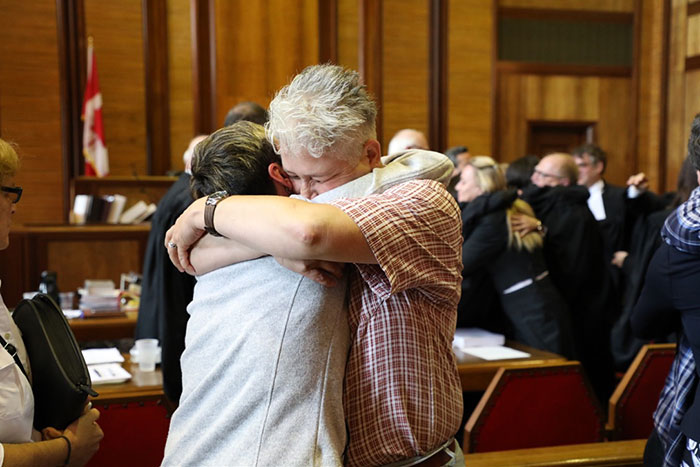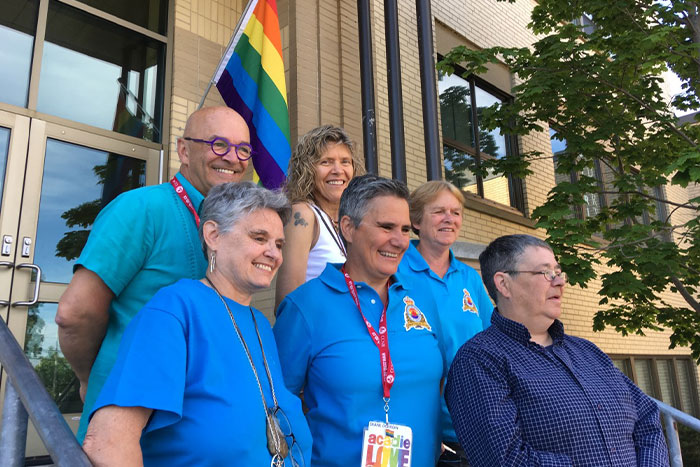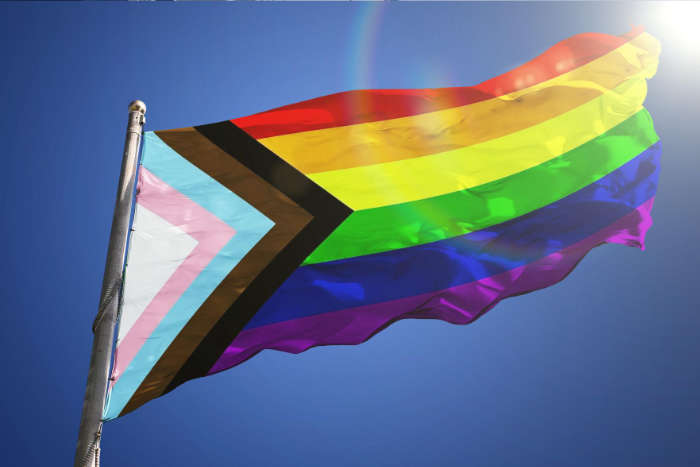The Purge: LGBT Soldiers and their Partners
Project Summary
Between 1997 and 2010, the co-founders of the P-SEC group conducted a longitudinal study to document, shed light on, and give voice to the experiences of LGBTQ+ Canadian military members and their partners. Little was known about their stories and experiences. Lynne Gouliquer and Carmen Poulin felt that there was an urgent need to document the experiences of the women and men who had lived through what they then referred to as the witch hunt. Many of these women and men were going to retire in the not-so-distant future, and no one had systematically documented their experiences. Carmen and Lynne reasoned that if they waited, reaching these individuals would be less and less possible. The first phase of the project focused exclusively on lesbian soldiers and their partners. Lynne had been in the military for 16 years and was still connected to many friends from whom she could solicit the participation. Using the snowball method, and in the spirit of friendship, respect, solidarity and confidentiality, these individuals generously agreed to share their experiences with them. By 1998, the initial findings regarding lesbian members of the military turned into Lynne’s master’s research project, which she then published as a chapter:
Gouliquer, L. (2000). Negotiating Sexuality: Lesbians in the Canadian Military. In B. Miedema, J. Stoppard, & V. Anderson (Eds.), Women’s Bodies/Women’s Lives: The Social and the Material, (pp 254-276). Sumach Press.
Carmen took the lead with documenting the experiences of the partners of lesbian soldiers and published the following article:
Poulin, C. (2001). “The military is the wife and I am the mistress” Partners of Gay Service Women. Atlantis, 26(1), (pp 65-76).
These two initial publications by the co-founders of the P-SEC research group were the start of a long commitment to document this dark period of sanctioned discrimination in the Canadian Armed Forces. After securing funds from the Social Sciences and Humanities Research Council (SSHRC), the project expanded into a multi-year, pan-Canadian research study. Participants included LGBTQ+ soldiers currently serving in the Canadian military at the time of the Purge, as well as those who had previously lost their careers due to sanctioned anti-LGBTQ+ discrimination within the military, and the partners of these soldiers. This research uncovered stories of a silenced existence of these individuals who dealt with state sanctioned discrimination, marginalisation, prejudice, and abuse, both psychological and sexual. But equally important, it revealed stories of resilience, hope, solidarity, and change.
Project Description
In 1969, the Canadian Parliament decriminalised same-sex relations between consenting adults. The parallel military policy, however, remained in effect until 1992. This policy, the Canadian Forces Administrative Order (CFAO)19-20, declared homosexuality a sexual abnormality and was grounds for discharging soldiers (Park, 1994). The period from 1980 to 1983 is vividly etched in the minds of many Canadian Forces soldiers. Many refer to this era as the ‘witch hunts’. During this time, the Special Investigation Unit (SIU) interrogated, investigated, and recommended the release of many military members for ‘homosexuality’ (Gouliquer, 1998). Despite the military’s attempts to eliminate ‘homosexuality’ from its ranks, many LGBTQ+ members continued to serve, and still do so today.
As a result of lawsuits filed against the Canadian Armed Forces, the Federal Court of Canada declared that military policy concerning homosexuality was contrary to the Canadian Charter of Rights and Freedoms (Park, 1994). Consequently, the Canadian Forces announced in 1992 that joining or serving in the military would no longer be restricted on the basis of sexual orientation (News Release/Communiqué, 1992). This change in military policy, however, did not prevent continued discrimination. For instance, it was not until 1996 that the Canadian Armed Force extended social- and medical-type benefits to members in non-heterosexual partnerships (CANFORGEN 094/96; Poulin, 2001). Military pension survivor benefits were not available in the context of non-heterosexual relationships until 1999 (Belkin & McNichol, 2000). Canadian Forces policies had been changing but our early findings indicated that relatively few LGBTQ+ soldiers took advantage of these changes. Many LGBTQ+ soldiers were still choosing to remain closeted because officially coming out in order to claim same-sex spousal benefits posed too great a risk to their career.
We interviewed 126 LGBT soldiers and/or their partners for this study between 1997 and 2010. We are so grateful for their participation and willingness to talk about their experiences, and for many, this meant having to recall and speak of very painful and difficult events. We have published and presented the results from this study in many academic journal articles and presentations. In addition to the academic output, this study contributed to social progress in several important ways:
Our experiences conducting this research and the contacts we made with purge survivors, allies, and other academics led to the creation of the ‘We Demand an Apology Network’ and its petition in both French and English. It was wonderful to see the objective of the network realised in November 2017 with the apology from the Trudeau Government to the LGBTQ+ community.
Data from this study were also used (while respecting the anonymity, confidentiality and confidence we promised to our participants) as evidence in the LGBT purge class action case. The case was settled in 2018. The settlement included financial compensation for those who were harmed by anti-LGBTQ+ discrimination in the military. The settlement also included funds for a commemorative monument, as well as an exhibit at the Canadian Museum for Human Rights.
References
Belkin, A., & McNichol, J. (2001). Homosexual personnel policy in the Canadian Forces: Did lifting the gay ban undermine military performance? International Journal, 56(1), 73-88. doi:10.1177/002070200105600105
Gouliquer, L. (1998). A menace to the gender order: The management of lesbian sexuality in the Canadian military. Unpublished master’s thesis, University of McGill, Montreal, Canada
Gouliquer, L. (2000). Negotiating sexuality: Lesbians in the Canadian military. In B. Miedema, J. M.Stoppard, & V. Anderson (Eds.), Women’s bodies, women’s lives: Health, well- being, and body image (pp. 254-277). Sumach Press.
Park, R. E. (1994). Opening the Canadian Forces to gays and lesbians: An inevitable decision but improbable reconfiguration. In W. J. Scott, & S. C. Stanley (Eds.), Gays and lesbians in the military: Issues, concerns, and contrasts (pp. 165-179). Aldine de Gruyter.
Poulin, C. (2001). “The military is the wife and I am the mistress”: Partners of lesbians in the Canadian military. Atlantis: A Women’s Studies Journal, 26(1), 65-76.
Publications
Gouliquer, L. (2012). Examining the life world of Canadian female soldiers: The effects of blatant and subtle discrimination. Canadian Psychology/Psychologie canadienne, 53(2a), 23.
Poulin, C., & Gouliquer, L. (2012). Clandestine existences and secret research: Eliminating official discrimination in the Canadian military and going public in academia. Journal of Lesbian Studies, 16(1), 54-64.
Poulin, C.,& Gouliquer, L. (2012). The Psycho-Social Ethnography of the Commonplace (P-SEC): A semi-structured qualitative approach to feminist research. Canadian Psychology/Psychologie canadienne, 53(2a), 272.
McCutcheon, J., Gouliquer, L., & Poulin, C. (2009). Sports and soldiering: Examining servicewomen’s experiences with military sports. Canadian Psychology/Psychologie canadienne, 50(2a), 41.
Moore, J. A., Poulin, C., & Gouliquer, L. (2009). Partners of Canadian lesbian soldiers: Examining the military family social support system. Canadian Psychology/Psychologie canadienne, 50(2a), 99.
Poulin, C., Gouliquer, L.,& Moore, J. A. (2009). Discharged for homosexuality from the Canadian military: Health implications for lesbians. Feminism & Psychology, 19(4), 497-516.
Gouliquer, L., & Poulin, C., & McCutcheon, J. (2008). Dissecting the menstrual cycle: A longitudinal examination of beliefs regarding menstruation and PMS. Canadian Psychology/Psychologie canadienne, 49(2a), 41.
Moore, J. A., Poulin, C.,& Gouliquer, L. (2008). Banned from serving: The affect of anti-homosexual laws on Canadian military women. Canadian Psychology / Psychologie canadienne, 49(2a), 270-271.
Gouliquer, L., & Poulin, C. (2005). For better and for worse: Psychological demands and structural impacts of the military on gay servicewomen and their partners in long-term relationships. In D. Pawluch, B. Shaffir, & C. Miall (Eds.) Doing Ethnography: Studying Everyday Life (pp. 323-335). Canadian Scholars’ Press. Authorship order was determined randomly.
St.Pierre, M., Poulin, C., & Gouliquer, L. (2005). Homosexual identity development in the context of the Canadian Forces: Organisational influences, schematic responses, and coping strategies. Canadian Psychology/ Psychologie canadienne, 46(2a), 200.
Gouliquer, L. (2004). Ask and tell [book review of officially gay: The political construction of sexuality and the US military, and don’t ask, don’t tell: Debating the gay ban in the military]. The Women’s Review of Books, XXI (8), 22-3.
MacAulay, S., Poulin, C., Gouliquer, L., Brazier, B., Hughes, J., Brazier, B. C. S., Arseneault, R., & Theriault, L. (2004). Transition house worker’s promises of confidentiality: A political and practical struggle. Canadian Psychology/Psychologie canadienne, 45(2a),136.
Poulin, C., & Gouliquer, L. (2004). Symposium: Translating theory into methodology: The intersection of sociologies and psychologies. Canadian Psychology/ Psychologie canadienne, 45(2a), 135.
Poulin, C., Gouliquer, L., Brazier, B., Hughes, J., Brazier, B., Arseneault, R., MacAulay S., & Thériault, L. (2004). Keeping it confidential: A struggle for transition houses. In M. L. Stirling, N. Nason-Clark, A. Cameron, B. Miedema (Eds.) Understanding Abuse: Partnering for Change (pp 87-110). University of Toronto Press.
Roxborough, H., Poulin, C., & Gouliquer, L. (2004). Discriminatory practices: Lesbian military members and their partners’ health. Canadian Psychology/Psychologie canadienne, 45(2a), 136.
Poulin, C. & Gouliquer, L. (2003). Part-time disabled lesbian passing on roller blades or PMS, Prozac, and essentializing woman’s ailments. Women & Therapy, 26(1/2), 95-108. Simultaneously published as a chapter of an edited book by Banks, M. E., & Kaschak, E. Women with visible and invisible disabilities: Multiple intersections, multiple issues, multiple therapies. The Haworth Press. Authorship order was determined randomly.
Gouliquer, L. (2001). Introduction: Women and the Canadian military special collection. Atlantis: A Women’s Studies Journal, 26(1).
Gouliquer, L. (2001). What gay servicewomen can tell us about the gender order. Feminism(s) Challenge the Traditional Disciplines (MCRTW Mongraph Series No. 1). McGill University, Montréal, Québec: McGill Centre for Research on Teaching and Women.
Poulin, C. (2001). “The military is the wife and I am the mistress” Partners of Gay Service Women. Atlantis, 26(1), 65-76.
Gouliquer, L. (2000). Negotiating sexuality: Lesbians in the Canadian military. In B. Miedema, J. Stoppard, & V. Anderson (Eds.), Women’s Bodies/Women’s Lives: The Social and the Material (pp 254-276). Sumach Press.
Gouliquer, L. (2000). Pandora’s Box: The paradox of flexibility in today’s workplace. Current Sociology, 48(1), 29-42.
Gouliquer, L., & Poulin, C. (1999). L’impact de la charte des droits et libertés pour les lesbiennes dans les forces armées canadiennes. Au-delà de l’invisibilité, 3(2), 8.
Poulin, C., & Gouliquer, L., (1999). Un bien drôle de mariage: Les lesbiennes et les forces armées canadiennes. Au-delà de l’invisibilité, 3(2), 9.
Poulin, M.B.C., Ross, L., Gouliquer, M.L., Fox, B., Thériault, L., Arseneault, R., Wuest, J., Merritt-Gray, M., Root, A., & Flowers, L. (1995). An evaluation and summary of the accumulated monthly reporting form: Usage of New Brunswick transition houses. Fredericton, NB: Muriel McQueen Fergusson Centre for Family Violence Research.
Presentations
St. Pierre, M., Poulin, C., & Gouliquer, L. (2005). Homosexual identity development in the context of the Canadian Forces: Organisational influences, schematic responses, and coping strategies. Canadian Psychological Association (CPA) convention, Montréal, Qc.
Poulin, C., Gouliquer, L., & Harvey, J. (2004). Lesbians in the Canadian military identity, Self-disclosure, and individual adjustment. Canadian Sex Research Forum, Fredericton, NB.
Roxborough, H., Poulin, C., & Gouliquer, L. (2004). Discriminatory practices: Lesbian military members and their partners’ health. Canadian Psychological Association (CPA) convention, St-John’s, Newfoundland.
Roxborough, H., Gouliquer, L., & Poulin, C. (2004). Military investigations for homosexuality: Psychological, physical, and social impact on lesbian servicewomen and their partners. Canadian Sex Research Forum, Fredericton, NB.
Poulin, C. (2003). Roundtable III: Experiences of foreign militaries. Don’t ask, don’t tell: 10 years later.
Poulin, C., & Gouliquer, L. (2002). Examining institutional moments and cognitive schemata in the everyday of Canadian military lesbians and their long term partners. (April 17, 2002) Department of Women Studies’ Colloquium Series, University of York, United Kingdom.
Poulin, C. (2002). Lesbian partners of Canadian military women soldiers: A tug of war between two cultures. Inter-University seminar on armed forces and society: Challenge and change for the military institution, the profession, and leadership in the 21st century. Kingston, Ontario
Harvey, J., Poulin, C., & Gouliquer, L. (2001). Developing a positive sexual identity as a gay woman in the Canadian military: An oxymoron? Canadian Lesbian and Gay Studies Association Meeting, Social Sciences and Humanities Congress, Laval, Québec.
Gouliquer, M.L., & Poulin, C. (2001). For better and for worse: Psychological demands and structural impacts of the military on gay servicewomen and their partners in long-term relationships. 18th Annual Qualitative Analysis Conference: Doing ethnographies and ethnographic doings, Hamilton, Ontario.
Poulin, C. (2001). Symposium: L’histoire / History (Chair). Canadian Lesbian and Gay Studies Association Meeting, Social Sciences and Humanities Congress, Laval, Québec.
Poulin, C. (2001). The invisible partners of gay servicewomen: The process of erasing the self. Canadian Psychological Association (CPA) convention, Laval, Québec.
Poulin, C., & Gouliquer, L. (2000). Partners of gay service women: “The invisible dependent.” Paper presented at the Canadian Lesbian and Gay Studies Association Meeting, Social Sciences and Humanities Congress, Edmonton, Alberta.
Poulin, M.B.C., (1999). Closeted military wives: The untold story of partners of lesbians in the Canadian military. Paper presented at the Canadian Research Institute for the Advancement of Women (CRIAW) convention, Sudbury, Ontario.
Purpose and Importance
of this Study
To make visible the untold stories of lesbian and gay Canadian military members and their partners.
To help us understand how the military responds and responded to homosexuality and sexual orientation.
To make recommendations based on the findings.
To examine how sanctioned discrimination within an organisation has been experienced by a marginalised group.
To evaluate the effectiveness of the removal of official discriminatory policies from the perspective of gays and lesbians associated with the Canadian military.
To document a fascinating piece of Canadian military history.
Quotes
Prior to 1992: Under the Canadian Forces Administrative Orders and the National Defence Act, any member of the Canadian Forces who was suspected of being or found to be a ‘homosexual’ was investigated, interrogated, and discharged from the Canadian military (CAFO 19-20). Many Canadians were humiliated, degraded, lost their military careers, suffered health-wise, and some did not survive the ordeal due to the discrimination they endured from the military investigations. Canada owes them an apology. The following quotes illustrate their experiences (Note: all names and identifying information has been changed to protect the individuals):
Danni recalls that the Canadian specialised military police unit (SIU) “locked the car. I kid you not. They marched me out of work, one on either side of me, stuck me in the back of the freaking K-car. It was specifically intimidating. Then they put me in the little four-by-six room and … said — We’ve been told that you’re a practising homosexual.” (Danni: Reservist, 1978–80) (Poulin, Gouliquer, & Moore, 2009, p 502).
“You couldn’t be gay. And God help you if you were.” (Larry)
Issy recalls how the military special police force interrogated her for explicit personal details: “They wanted to know how many times I had an orgasm! They wanted to know positions. They wanted to know every detail” (Issy: Regular Force soldier, 1980–90). (Poulin, Gouliquer, & Moore, 2009, p 501).
Zachary recalls this about his interrogations: “The question they asked me… repeatedly was: If you get a blow job, do you ejaculate in the guy’s mouth?” (Zachary).
Guilaine talks about how she nearly lost her life after being discharged from the Canadian military: “When I left the military, I was about 23 … I started to work but I lost my night job and I could not continue school, I had no more income … I fell into a deep depression and attempted suicide’ (Guilaine: Reg. Force, 1981–84). (Poulin, Gouliquer, & Moore, 2009).
Fiona, the sister of a former discharged soldier discusses how her brother was affected and his suicide: “He was traumatized… They made him believe that he was a pervert.… That he could never be trusted with anything or anyone…. He said that he’d ruined our mother’s life, his life, everyone’s life, and he could no longer live with that.” (Fiona).
Support for this Study



Share this Study
Related Links
Media
LU prof welcomes apology to LGBTQ community
Sudbury Star
A battle that we’ve won: LGBTQ military members get personal apologies
CBC News, Nov 25, 2019. More than 400 letters of apology have been received, with another 26 to be sent
Des victimes des politiques anti-gais demandent des excuses officielles
Le Devoir – 17 août 2015
Canada to apologise for ‘LGBT purge’ in government
BBC News. Jessica Murphy. June 25, 2017
En croisade à Ottawa pour les droits des homosexuels dans l’armée
Radio-Canada, June 3, 2015
Dr. Carmen Poulin’s interview with Martine Blanchard (French)
Coalition Calls for Official Apology for Anti-LGBT Military Purge
Daily Xtra, Marco Vigliotti, June 4, 2015
Decades-long campaign exposed and fired Canadian gays and lesbians.
Former Canadian Forces Members Say They were Kicked Out for Being Gay, Ask Government for Apology
Global News, Vassy Kapelos, June 2, 2015
LGBTQ Members of Canadian Forces Should Receive Apology for Past Dismissals
Craig Scott, NDP MP News – June 2, 2015
NDP MP Craig Scott (Toronto-Danforth) is calling on the government to issue an official apology for the decates of discriminatory treatment of LGBT members of the Canadian Forces.
A military first
CBC News, Jun 7, 2013
CFB Edmonton 1st base to raise gay-pride flag. Edmonton Garrison raises rainbow colours for Pride Week.
Le drapeau de la fierté gaie flotte à la base militaire d’Edmonton
Radio Canada, 7 juin 2013
Pour la première fois dans l’histoire des Forces canadiennes, le drapeau de la fierté gaie a été hissé dans une base militaire du pays, celle d’Edmonton.




